#[ DARCY — george wickham ]
Text
This is unnecessarily long, but: I was just thinking about Wickham's predation on fifteen-year-old Georgiana Darcy and then, almost exactly a year later, Wickham's predation on sixteen-year-old Lydia Bennet.
There are obvious parallels between the two incidents. In fact, they're so obvious that I think the incidents are sometimes treated as equivalent, with the consequences only differing by happenstance. I don't think that's true, personally.
There are some mechanistic sort of differences—Wickham put a lot more effort and planning into the Georgiana situation. He wanted to marry her for her money and to make her brother suffer. She had to be isolated from people who would look out for her interests, he had Mrs Younge in place, he had known Georgiana as a child and was able to exploit his own previous kindness to her as her father's godson, etc.
And Georgiana, despite all of this, and despite being swept away by a teenage infatuation with an extremely attractive man, was still uncomfortable with it. She was worried about disappointing a brother who raised her and whom she deeply loves and admires. When her brother actually showed up by surprise, she decided to tell him everything; Darcy takes pains to give her credit for this. Adaptations generally downplay Georgiana's active decision-making here, but the only element of chance is Darcy deciding to go to Ramsgate at all. He insists that he was only able to act because Georgiana chose to tell him what was going on.
This isn't meant to be an indictment of Lydia, though. Does she admire the parents who raised her? No. But why would she? Especially why would she admire a father who treats her mother and sisters and herself with profound contempt and no sense of responsibility? Why would she ever confide in him?
It's not like Lydia doesn't confide in anyone. In fact, she too confides in an older sibling, her sister Kitty. And in one sense, her trust in Kitty is not undeserved. Kitty does keep the secret. Presumably, she does this because, despite her occasional annoyance with Lydia, she is very much under her influence and goes along with whatever Lydia does. Regardless, she is trustworthy in that sense. Moreover, we see at the end of the book that Kitty is easily improved by being placed in better environments and taught how to behave. She just didn't know better.
How was she going to judge Lydia's situation correctly? Who was teaching her to judge anything correctly? Certainly not their parents.
If Mr Bennet had bothered to interest himself in his younger daughters and try and influence them for the better, impressionable Kitty is probably the one who would have benefited the most. The whole Lydia/Wickham thing would have fallen apart before it went anywhere if all the girls had been been properly raised, even if Lydia did exactly the same things.
And Lydia likely wouldn't do the same things if she'd been brought up properly and, you know, treated with a baseline of respect rather than being openly mocked by her father, the person most able to affect her development. Instead, at barely sixteen, she's been continually rejected by her father, over-indulged by her mother, and flattered by adult men (28-y-o Darcy says he and Wickham are nearly the same age). And she still tells someone what's going on, even though she doesn't care about her parents' opinions or the consequences of her actions. And she was under the protection of a colonel and his wife at the time, who also could have told someone or acted, and didn't.
It's not that nobody could have done anything about the Lydia/Wickham situation. It's that nobody did until Darcy found out and tried to extract her. But it was, in one sense, too late. To Lydia, he's just some unfun acquaintance who says boring things like "go home to your family and I'll do what I can to cover for you." That is, he tries to do what he did for Georgiana.
But Lydia is not Georgiana—she did not choose to tell him about any of this. She did not want to be extracted because she didn't know and couldn't be quickly made to understand what marriage to Wickham would mean in the long term. And she didn't care what her family thought because she had no reason to, pragmatically or psychologically.
Georgiana, otoh, did care about her family's welfare and the good opinion and affection of the head of her family. But despite their radical differences in personality, the most fundamental difference between the girls IMO is that Georgiana had every reason to believe that disappointing Darcy and losing his respect would be a change from the norm.
Normally he is affectionate and attentive towards her. They write each other long letters, he defends her to other family members, and praises her frequently. Georgiana, quiet and intimidated though she may be, talks more when he's around. Disappointing him had actual stakes for her.
Put another way, the potential loss of his good opinion mattered to her because he's gone to the trouble of raising her as well as he can and forming a good relationship with her. She chose to tell Darcy the whole thing because he had earned her affection and trust in a way that Mr Bennet has utterly failed to do. Even Darcy happening to visit Georgiana at Ramsgate comes from his affection and attention to Georgiana's welfare, even if he couldn't have known what would follow from checking on his sister at that particular moment.
Chance is always part of life, and it's part of the novel and these situations. But a lot of how these scenarios wound out was not determined by chance but by long-existing patterns in these girls' educations and relationships.
#this actually spun off from a different post about the contrast between darcy and mr bennet#they're alike in some ways but it only makes the differences all the more glaring#and i don't think we see that more than in how they conduct themselves towards the young girls in their care#and in the drastic consequences of how they educate and relate to those girls#georgiana and lydia made choices but there's a point at which harping on choice!!! and personal responsibility!! doesn't have much value#and the contributing factors and context of those choices matter so much more#anghraine babbles#long post#austen blogging#austen fanwank#georgiana darcy#lydia bennet#fitzwilliam darcy#george wickham#mr bennet#catherine bennet#some unflattering references to mrs bennet but this is more of a mr bennet hate post :)
3K notes
·
View notes
Photo





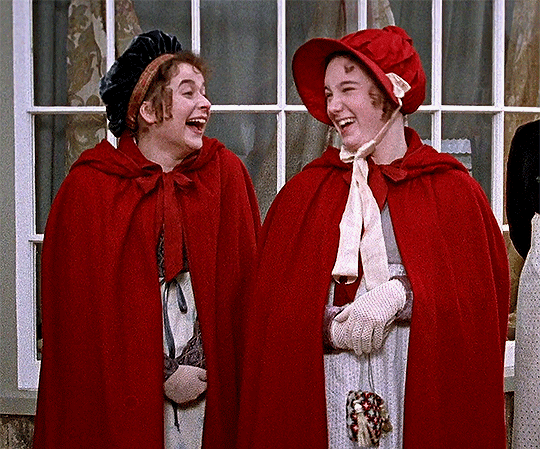
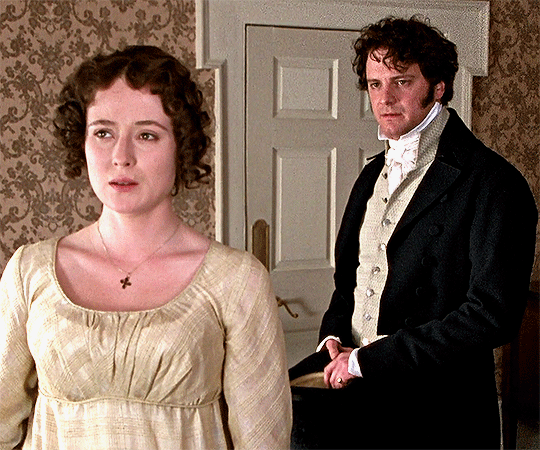

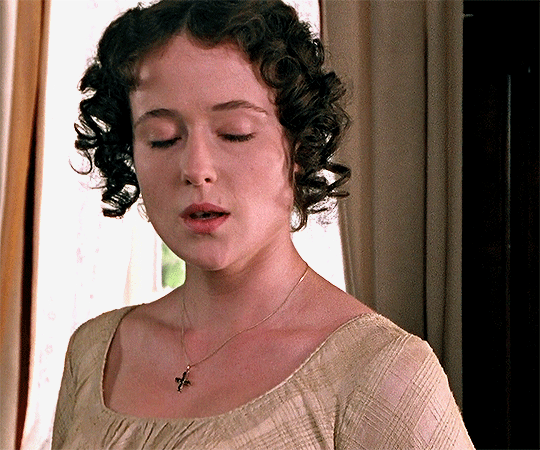
You are mistaken, Mr. Darcy. The mode of your declaration merely spared me any concern I might have felt in refusing you, had you behaved in a more gentleman-like manner. You could not have made me the offer of your hand in any possible way that would have tempted me to accept it. From the very beginning your manners impressed me with the fullest belief of your arrogance, your conceit and your selfish disdain for the feelings of others. I had not known you a month before I felt you were the last man in the world whom I could ever marry!
PRIDE AND PREJUDICE (1995) dir. Simon Langton | Episode 3
#pride and prejudice 1995#perioddramaedit#periodedit#austenedit#papedit#prideandprejudiceedit#tvedit#userbennet#catalinabaylors#tuserbea#userpavlova#userperioddrama#userdraconis#pride and prejudice#elizabeth bennet#fitzwilliam darcy#georgiana darcy#george wickham#*p&p1995#*
851 notes
·
View notes
Text
Elizabeth Bennet in the 1995 Pride and Prejudice series has eyes that are the definition of “doe eyes to fox eyes”.
In episode six when she’s talking to Wickham she swaps from innocently talking to him to getting in little jabs during their conversation and then instantly switches back to a more innocent look. God I love her so much.
#elizabeth bennet#jane austen#pride and prejudice#fox eyes#doe eyes#i love her#😍#fitzwilliam darcy#georgiana darcy#pride and predjudice 1995#george wickham#elizabeth bennet x fitzwilliam darcy
66 notes
·
View notes
Text

Mrs. Bennet and Lizzie
#and I mean that in the most heartbreaking way#incorrect pride and prejudice quotes#pride and prejudice#the lizzie bennet diaries#pride and prejudice series#fitzwilliam darcy#lizzie bennet#pride and prejudice 2005#pride and prejudice 1995#elizabeth bennet#pride and prejudice (2005)#charles bingley#jane austen#bing lee#jane bennet#lydia bennet#george wickham#incorrect jane austen#incorrect emma quotes#william darcy#tiktok#one day I’ll write an essay about the dichotomy of Mrs bennet and Lizzie#they are just#such a heartbreaking pair
715 notes
·
View notes
Text

Had to make a book cover for a classic book in my illustration class. Had just finished Pride and Prejudice and thought why not!
#my art#digital art#procreate#digital fanart#books and libraries#books#Fanart#pride and prejudice#pride and prejudice fanart#mr darcy#elizabeth bennet#jane austen#jane bennet#mr bingley#mary bennet#lydia bennet#kitty bennet#mr collins#george wickham#charlotte lucas
34 notes
·
View notes
Text
I've been thinking of the idea that Jane Austen might have been partly inspired to create Elizabeth and Darcy in Pride and Prejudice by Beatrice and Benedick in Much Ado About Nothing.
@anghraine has posted repeatedly about how P&P can almost be read as a then-modernized retelling of Much Ado, like Clueless is to Emma. Not only because of the Beatrice and Benedick/Elizabeth and Darcy parallels, but other details and character parallels too.
If Austen really was inspired by Shakespeare in this case, then I think she deserves praise for one thing that isn't often mentioned: that in writing her Beatrice and Benedick-like couple, she also wrote counterparts of Hero and Claudio, but she handled them in a way that's much less... divisive (to put it nicely) than the always-difficult Hero/Claudio storyline. Namely by dividing Hero and Claudio's role in the plot between two couples: Jane/Bingley and Lydia/Wickham.
The parallel between Jane and Hero is more obvious, since Jane is Elizabeth's sweet, innocent, most beloved family member just like Hero is to Beatrice, and since like Hero, she temporarily loses the man she loves because he's led to misunderstand her, which makes Elizabeth, like Beatrice, beside herself with rage. (If she could, Elizabeth probably would eat Darcy's heart in the marketplace after she learns he convinced Bingley to leave.) But instead of being melodramatically tricked into thinking Jane is sleeping with another man, Bingley is only led to think she likes him as a casual acquaintance but no more, and instead of taking her to the altar only to publicly shame and reject her (which would be a ridiculous thing to do for the mere "crime" of not feeling romantic love), he just quietly leaves the neighborhood without proposing or confessing his love to her, and without realizing the pain it causes her. This makes it much easier to root for Bingley to reunite with Jane and finally marry her than it is to feel the same way about Claudio.
But of course Hero's public shaming does more than break her heart: it also threatens to ruin her reputation forever, and her family's too. Austen also places her heroine's family in this type of danger, and just like Shakespeare did with Benedick, she has Darcy's efforts to set things right be the final stroke that brings the two formerly-battling love interests together as a couple. But thankfully, instead of tainting Jane and Bingley's sweet little romance by having them be the source of the near-disgrace, she has Lydia run off with Wickham. Effectively, her solution is "What if Beatrice and Hero had another young female relative, and instead of tricking Claudio, Don John straight-up seduced the third girl and that was the cause of the family's shame?" And instead of challenging Wickham to a duel, a la Benedick with Claudio, Darcy simply pays him off to marry Lydia: a choice that's telling about the difference in time, place, and genre between Austen's realistic, satirical portrayal of Georgian England and Shakespeare's portrayal of Renaissance Italy. (Austen furthers this point when Mrs. Bennet convinces herself that Mr. Bennet will duel with Wickham over Lydia's honor and panics at the thought, only to seem disappointed when he doesn't.)
I don't know if Austen consciously drew inspiration from Much Ado when she wrote Pride and Prejudice or not, but if she did, she made some clever character changes that suit the differences between a slice-of-life Georgian novel and a Shakespearean stage comedy.
#pride and prejudice#much ado about nothing#jane austen#william shakespeare#elizabeth bennet#beatrice#fitzwilliam darcy#benedick#jane bennet#lydia bennet#hero#charles bingley#george wickham#claudio#don john#comparison
1K notes
·
View notes
Text
I have thought of a cursed Pride and Prejudice AU:
• Darcy leaves Georgiana's elopement out of the explanatory letter he writes after the failed proposal at Hunsford, only revealing Wickham's refusing the living in exchange for money and then demanding it anyway. This still softens Elizabeth opinion of him, she still believes him, but has less sway over her feelings.
• When she sees Wickham again she still likes him enough to want to find out the truth. At her first hint he immediately confesses "the truth". He does a very good job of mourning the folly of his youth and explains how ashamed he is of his actions now. He owns that he perhaps ought to be less resentful towards Darcy, but claims that Darcy did not scruple to disdain him for a moment of folly, which, he claims, was brought on purely a by distress of circumstances. He also wishes he would have told her the whole truth immediately, but he simply couldn't bear to think it might sink him in her opinion. Elizabeth, flattered, and aided by Jane's endless faith in human good nature, believes him.
• After agreeing to let Lydia go to Brighton, Elizabeth manages to convince Mr. Bennet that this is actually a very very bad idea. But, judging that it would mean outright war at home if he retracts his permission now, he grumpily decides to take the whole family to Brighton.
• Because of this, Elizabeth does not go with the Gardiners to Derbyshire. Wickham improves his friendship with the whole Bennet family and keeps paying Lizzy special attention.
• Instead of going to Scarborough, the Bingleys and both Darcy's go to Brighton.
• Darcy sees Elizabeth again and immediately tries to show her he has listened to her reproofs on his manners. She, now convinced of his being a decent man, but not softened by a Pemberley meeting and the praise of his servants, is pleased with this change in behaviour, but not immediately so moved by it as she would have been.
• Wickham is for the first time able to see Darcy in company with Elizabeth, and, knowing Darcy's mannerisms better than almost anyone except for Georgiana, immediately sees that Darcy is genuinely in love with her. He also sees how absolutely horrified Darcy is to see him with the Bennets.
• Wickham then changes his idle flirting to full on courtship of Elizabeth, purely to get back at Darcy.
#I have no intention of writing this so it's going on the blog#so it is out of the head#austen#jane austen#pride and prejudice#george wickham#elizabeth bennet#fitzwilliam darcy#sunfreckle's scribbles
43 notes
·
View notes
Text
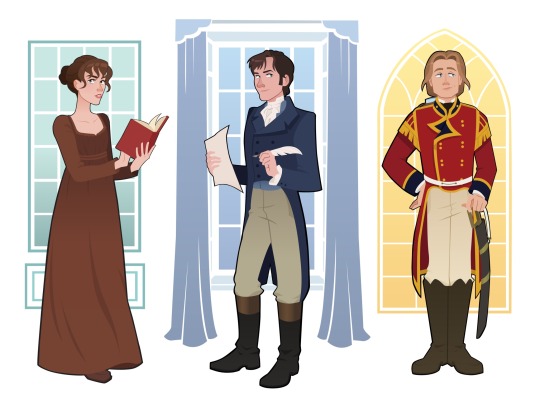

Pride and Prejudice characters for class! Done with the pen tool in Adobe Illustrator.
#pride and prejudice#pride and prejudice 2005#elizabeth bennet#fitzwilliam darcy#george wickham#me: I’m never doing anything solely with the pen tool again#also me: has at least three assignments where I have to use solely the pen tool…
185 notes
·
View notes
Photo

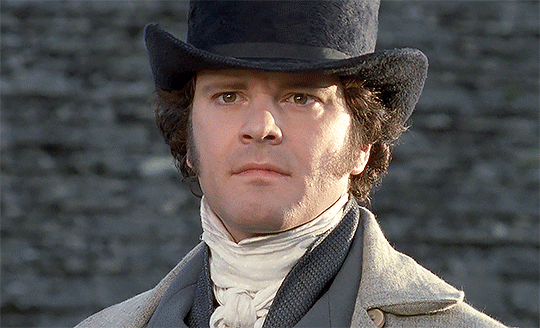

If looks could kill, Georgie boy would be dead already!
134 notes
·
View notes
Text
This week’s selection is a TikTok thirst trap of Daniel Cleaver formatted in a series of clips with Beyonce’s “Donk” playing in the background. It starts with a clip where Daniel Cleaver (played by Hugh Grant in the 2001 Bridget Jones’s Diary movie adaptation) has fallen into the lake and is standing half-submerged and soaking wet with a half-buttoned shirt. While I think we’ve learned that the internet loves a man in a half-buttoned wet shirt, I do find it interesting that where we trace that to (for this class at least) is the BBC adaptation of Pride and Prejudice in which Darcy has the wet shirt. As a matter of fact, BBC Darcy is the same actor who plays Mark Darcy in Bridget Jones’ Diary. The first clip is meant to draw the audience in, so it’s typically the clip a creator thinks is most persuasive (the most attractive video of an actor/character). Thus, the creator must have thought Cleaver in a Darcy-esque wet shirt moment is the most attractive scene of his character. To me this begs the question, do we find Wickham (Cleaver) most attractive when he is most like Darcy (which we’ll get back to)? Or, more generally, why are we finding Cleaver attractive at all?
I wouldn’t be so curious about a one-off thirst trap because there’s always someone who’s going to find a character attractive (even the ones the general population loathes), but when I searched Bridget Jones’s Diary on TikTok, I’d say a solid 50-60% of the videos were Daniel Cleaver thirst traps. If we’re reading this as a Pride and Prejudice adaptation, he’s Mr. Wickham, so Mr. Wickham thirst traps should be 50-60% of the Pride and Prejudice media. However, when I went to find a Mr. Wickham edit, I was incapable of it despite searching under three different hashtags and being on the lookout for any Wickham from any close-to-book adaptation. So, Wickham is not attractive, but Cleaver is, even though they’re meant to be the same character?
The easiest answer for this difference is the obvious one, that Hugh Grant is attractive enough to make most media consumers forget about Cleaver’s unsavory characteristics. This seems probable, but I think there’s a bit more to this. The first layer for me is the likeability of the main girl character which Wickham/Cleaver is wronging. Personally, I don’t like Bridget. I feel bad for her, occasionally I even empathize with her, but I don’t like her and I can see how other people would feel the same way. Elizabeth Bennet, on the other hand, is one of my favorite book characters. We talked in class today about Bridget being a sort of anti-hero, which I definitely see, but there is a solid amount of TikToks which idolize Bridget, so I’m not sure if we can totally mark down the lessened Cleaver hate as more hate towards the person he’s wronging. Also, as someone who dislikes Bridget, I still dislike Cleaver, so that can’t be the only reason.
The next layer is perhaps that Cleaver’s wrongs are less severe than Wickham’s in the book. He didn’t elope with her younger sister, but Cleaver did make really awful comments about Bridget’s body, just be a generally bad boyfriend (dismissing her wishes, shirking family obligations, etc.), and cheat on her! I feel as if that’s about equivalent, especially for modern day, but there may be people who feel differently.
The final layer that I come to then is kind of calling back to my previous point of who the wrongs are directed at. If we look at Wickham eloping with young girls, then there is an argument to be made that a large part of Wickham’s problematic behavior is directed at Darcy because of his attempting to elope with Darcy’s sister and begging/scheming for money. Cleaver wrongs Darcy by being the man his wife cheats on him with, but arguably the responsibility is at least shared between Cleaver and Darcy’s wife. Meanwhile, Darcy’s sister would have been too young and naive to know better, so that’s definitely on Wickham. Therefore, does the internet like Cleaver more than his Wickham equivalent because he wrongs Darcy less? Is it easier to focus on his looks/charm and glaze over the rest when Darcy (whose edits make up the rest of the Bridget Jones TikTok presence) is not being as grievously wronged? And, to call back to my original question, do we find Wickham (Cleaver) most attractive when he is most like Darcy? I don’t want to reduce all media consumers to Darcy-mania, but I feel as if there’s an element of it here. He’s found more attractive when he’s wronging Darcy less and when he’s doing Darcy things (like being soaking wet from a dip in a lake/pond). This, to me, suggests that Darcymania can spread even into pieces of media more abstracted from the source text where even characters who are very loosely based on Darcy get preference and the characters around him feel the effects of that.
12 notes
·
View notes
Text
[Darcy] saw Wickham, and afterwards insisted on seeing Lydia. His first object with her, he acknowledged, had been to persuade her to quit her present disgraceful situation, and return to her friends as soon as they could be prevailed on to receive her, offering his assistance, as far as it would go.
Austen, Jane. Pride and Prejudice (p. 186)
#thank you to the one (1) person who recognised the best option was to get lydia away from wickham no matter the consequences#ofc lydia refused but hey. the attempt was made and i value that even more than how he mitigated the situation's pitfalls later#talking to the void#quotes#pride and prejudice#books#bookblr#fitzwilliam darcy#lydia bennet#george wickham#jane austen
39 notes
·
View notes
Text
I couldn't work it into the other post, but something I was also thinking about with regard to Wickham as a child is ... okay, on the one hand, I think it's important to bear in mind that child Wickham was, in fact, a child. We can't just assume he was evil from day 1. I find him more interesting if he's not intrinsically evil, and I do have some sympathy for the weird position he was in.
In some ways, Wickham seems to have been treated as essentially another son. Mrs Reynolds says that Mr Darcy raised him (entirely at his own expense), Wickham says that he and Darcy were objects of the same parental care, Darcy that Wickham was brought up to expect exertion on his behalf and was the favorite of his (Darcy's) father. Wickham was given a gentleman's education, sent to school and Cambridge, and a valuable living in the Church was planned for him. This is the kind of thing that would be done for him if he actually were a younger son.
But the thing is ... he's not Mr Darcy's son. He's the son of Mr Wickham, Mr Darcy's steward. Wickham is in reality a charity case entirely dependent on the Darcys' good will—this is part of why Darcy says it would have been a depravity to turn on him without reason. Wickham's brought up for genteel life, but the path set out for him is one he is remarkably ill-suited to (not only morally, as it will turn out, but temperamentally). I've sometimes wondered what it was like to be Wickham at ... say, 12 or 13.
Still, I also wonder if he was already kind of a handful.
Evidently not to Mr Darcy—Darcy says his father not only enjoyed Wickham's society due to his engaging manners, but always had the highest opinion of him. We have no idea what Lady Anne thought or did. But realistically, the people who dealt with young Wickham and Darcy the most were probably the servants.
Wickham insists that Mrs Reynolds was fond of him. Maybe she was, though she has nothing good to say about him now. She describes him in fairly impersonal terms at Pemberley, and after saying he's in the army now, remarks, "I am afraid he has turned out very wild." She seems pretty eager to shift the conversation to Darcy and says, "But I have always observed, that they who are good-natured when children, are good-natured when they grow up; and he [Darcy] was always the sweetest tempered, most generous-hearted boy in the world."
I've wondered if this conclusion was affected by Wickham as well as Darcy—if she sees something of the Wickham who turned out wild in her memories of Wickham the child, and this reinforces her sense of the significance of childhood behavior. She insists that she's never had a cross word from Darcy, even as a small child (she's been at Pemberley since he was 4, i.e. 24 years). But given her conclusions about children and her characterization of adult Wickham, I wouldn't be surprised if the first people to experience the brunt of Wickham's poor behavior were the servants at Pemberley.
#anghraine babbles#long post#anghraine's headcanon#george wickham#mrs reynolds#fitzwilliam darcy#austen blogging#pride and prejudice#jane austen
251 notes
·
View notes
Text
I am convinced Darcy is bisexual and when he was fifteen, he had a massive crush on Wickham.
#pride and prejudice#a s fischer original#george wickham#fitzwilliam darcy#an unfortunate place to lay his affections to be sure#makes another parallel between darcy and lizzy#and also an interesting one between him and georgiana (and lydia)#but mostly it's just really funny
8 notes
·
View notes
Text

Doodles I did while watching Pride and Predjudice 1995 with my roommates of very silly self indulgent Second Gen story ( soley made really to drive Mr Darcy to distraction)
George Wickham Jr. is invited to Christmas at Pemberly because Wickham and Lydia are basically on the run from their creditors again and Lizzie isn't about to let her nephew starve on the streets during winter no matter the relations between the parents.
And turns out to be a good thing they did as all the little Bennett cousins go out to skate on the frozen lake and young Silas Darcy falls through the ice, and George being the oldest and strongest manages to save him.
The boys recuperate together during the rest of the holidays and become fast friends--much to the concern of Mr Darcy--and that friend continues into their adult years where it starts to turn into something more...
(I know they're cousins they're also fictional and adults and it was legal then-- even if not for necessarily this circumstance--and they're gay they ain't having any bio kids anyway )
#darcy is honestly less concerned that his son and heir is into men then that its this particular man#wickham couldn't care less all he sees is another attempt to try and seduce a Darcy heir while sticking it to Darcy senior#george jr is less then enthused with his father's attempts to be his Wingman Shoulder Devil#he's managed to scrounge up some morals despite his parents#if anything he's reluctant to act on his feelings both due to not wanting his father to mess with Silas and not get Silas into legal troubl#Silas just wants to get smooched#my art#pride and prejudice#jane austen#george wickham#mr darcy#fitzwilliam darcy#jane austen ocs#this has been a good art day for me xD#my ocs#victorian romance#technically still Georgian but no one cares about George or William IV
19 notes
·
View notes
Text
Darcy, after the (failed) proposal: She knocked that smug look off my face but luckily I was wearing a smaller smug look underneath.
#i think someone else did this already but oh well#incorrect pride and prejudice quotes#pride and prejudice#the lizzie bennet diaries#pride and prejudice series#fitzwilliam darcy#lizzie bennet#pride and prejudice 1995#pride and prejudice 2005#elizabeth bennet#pride and prejudice (2005)#charles bingley#bing lee#jane austen#lydia bennet#jane bennet#george wickham#incorrect emma quotes#incorrect jane austen#tiktok#william darcy
542 notes
·
View notes
Note
Following your answer on JAFF first names, how likely is it that Mr Darcy senior is called George?
This question is in reference to this post.
I believe that one is pretty likely. Mr. Darcy Sr. is George Wickham's godfather (so possibly named in honour of him) and he has a daughter named Georgiana. His only son is named using his mother's last name so it's the father's "turn". I would say it's even more likely because of the massive age gap between Darcy and his sister, they probably weren't thinking there would be another living child.
We see gender-flip naming in Lady Susan, her daughter is named Frederica after her husband Frederick. We also see John Knightley naming the second boy after himself after the first is named for his father-in-law (Henry and John respectively).
Also, it would be so weird if George Wickham had married Georgiana and they were George & Georgiana... good thing Austen prevented that one. (I mean I know there were other reasons but still! lol) But with so many people with similar names in this era it must have happened. Henry & Henrietta,...
#naming conventions#jane austen#pride and prejudice#mr. darcy sr.#george wickham#George & Georgie the insanity
38 notes
·
View notes